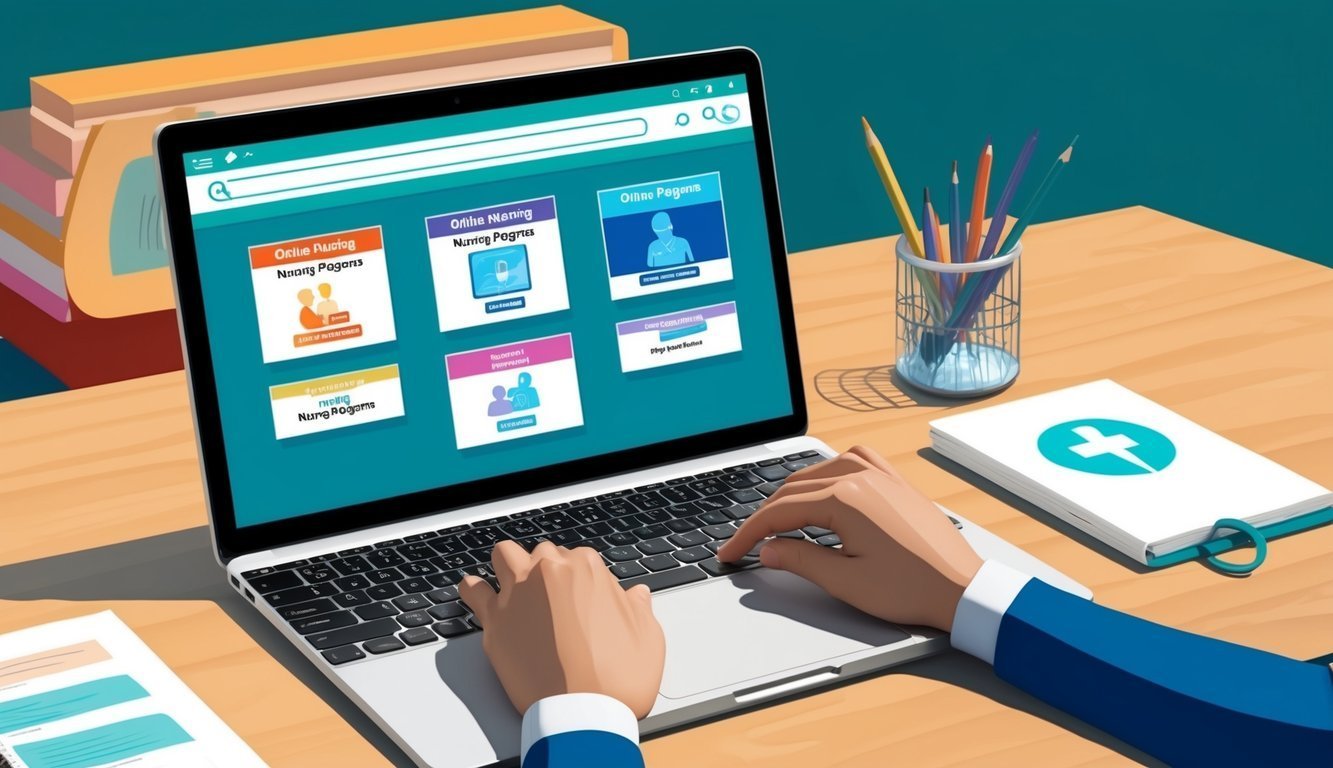As a registered nurse looking to advance your career, pursuing a Master of Science in Nursing (MSN) can open many doors.
The cheapest RN to MSN online programs offer cost-effective pathways that allow you to enhance your education without incurring significant debt.
These programs provide the flexibility to balance your studies with your current job while preparing you for leadership roles in healthcare.
Finding an affordable online RN to MSN program doesn’t mean sacrificing quality.
Many accredited institutions provide excellent curriculum options focused on nursing education, ensuring that you receive a comprehensive education that meets industry standards.
Exploring various programs will help you compare tuition costs, program lengths, and available concentrations.
By investing your time in researching the best options, you can make an informed decision that aligns with your career goals.
Consider leveraging resources that discuss the most affordable programs available to ensure you choose one that fits your financial and professional needs.
Exploring RN to MSN Online Degree Options
When considering an RN to MSN online program, you will find a variety of options to meet your professional goals.
This section discusses the importance of accreditation and the structure of these programs, ensuring you are well-informed before making a choice.
Accredited Online RN to MSN Programs
Choosing an accredited program is essential for your success and career advancement.
Look for programs recognized by the Commission on Collegiate Nursing Education (CCNE) or the Accreditation Commission for Education in Nursing (ACEN).
Accreditation ensures that the program meets high educational standards.
Some notable accredited online RN to MSN programs include:
| University | Specialization Options |
|---|---|
| Sacred Heart University | Family Nurse Practitioner, Nurse Educator |
| Liberty University | Various tracks including Nurse Leadership |
| West Texas A&M University | Specializations in education and administration |
These degrees are designed to prepare you for advanced roles in nursing, and having a degree from an accredited institution can improve your employment prospects.
Program Length and Structure
Most RN to MSN online programs require around 36 credits for completion, typically taking 2-3 years.
The length can vary, particularly if you choose to study part-time.
Programs are structured to offer flexibility, allowing you to balance work and education.
Common elements include:
- Core Courses: Essential knowledge for advanced nursing practice.
- Specialization Courses: Focused study in areas like Nurse Practitioner or Nurse Educator.
- Capstone Project: A practical component to demonstrate your skills in real-world scenarios.
Online formats often utilize asynchronous learning, providing you the ability to complete coursework on your schedule.
This model is ideal for working nurses.
Affordability and Tuition Considerations
Understanding the cost associated with pursuing an RN to MSN program is crucial.
Various factors, including tuition, financial aid options, and program comparisons, can significantly impact your decision.
Financial Aid and Scholarships
Many universities offer financial aid and scholarships to help manage the costs of your RN to MSN program.
Programs may include grants, loans, and merit-based scholarships tailored for nursing students.
For example, the University of Mary provides various scholarships specifically for nursing students, which can help reduce your overall expenses.
Additionally, explore federal assistance options like the FAFSA, which can make a significant difference in affordability.
You might also find state-specific scholarships available at institutions such as Northeastern State University or the University of North Alabama.
Researching and applying for these financial resources can alleviate some of the tuition burdens.
Comparing Program Costs
When comparing program costs, it’s essential to consider the total expense, including tuition, fees, and any associated costs for textbooks or technology.
Many online MSN programs aim to provide affordable education in the range of $7,000 to $15,000 annually.
Tuition Comparison Table:
| University | Estimated Tuition |
|---|---|
| University of Mary | $10,500 |
| Northeastern State University | $9,800 |
| University of North Alabama | $8,500 |
| Western Governors University | $7,790 |
Exploring these different options allows you to find a program that aligns with your budget while fulfilling your educational needs.
It’s also important to consider program length and flexibility, as these factors can influence overall costs and your ability to balance work and study.
Specializations and Advanced Nursing Roles
The transition from a registered nurse (RN) to a Master of Science in Nursing (MSN) opens doors to various specializations and advanced nursing roles.
Understanding these roles can guide your career path and enhance your professional opportunities.
Nurse Practitioner and Clinical Specialties
As a Nurse Practitioner (NP), you can specialize in areas such as family, psychiatric mental health, and adult-gerontology care.
Each specialty allows you to provide comprehensive patient management and, in many cases, prescribing medications.
| Specialty | Focus Area |
|---|---|
| Family Nurse Practitioner (FNP) | Preventive care for all ages |
| Psychiatric Mental Health NP | Mental health assessment and treatment |
| Adult-Gerontology NP | Health care for adults and the elderly |
| Neonatal Nurse Practitioner (NNP) | Care for newborns, particularly at-risk infants |
These specialties not only broaden your skill set but also significantly impact patient outcomes and satisfaction.
Advanced practice roles enable you to take on more responsibilities and play a critical role in healthcare delivery.
Nursing Administration and Leadership
If you gravitate toward the organizational side of healthcare, pursuing a focus in nursing administration and leadership can be beneficial.
Effective nursing leaders are vital for improving patient outcomes, managing resources, and leading teams.
In this role, you may become a Clinical Nurse Leader or take on managerial positions, overseeing nursing staff, operations, and quality improvement initiatives.
Key functions of nurse administrators include:
- Strategic Planning: Developing plans that align with healthcare goals.
- Staff Development: Training and mentoring nursing staff.
- Quality Improvement: Implementing protocols for better patient care standards.
These positions require strong communication, decision-making, and organizational skills, helping to shape the future of healthcare practices.
Clinical and Practicum Requirements
In online RN to MSN programs, clinical and practicum requirements are essential for gaining hands-on experience in nursing.
These components help bridge the gap between theoretical knowledge and practical skills, preparing you for a successful nursing career.
Understanding these necessities is crucial for meeting your program’s expectations.
Gaining Real-World Experience
To become a proficient nurse, you need to complete a certain number of clinical hours in a practical setting.
Typically, these hours vary by program but often require 400-600 hours of direct patient care during your clinical rotations.
Your program may include:
- Health Assessment: Developing skills to assess patient conditions.
- Community Health Nursing: Engaging with local health programs and outreach.
A clinical placement team usually assists in coordinating sites that match your educational goals.
Meeting these practicum requirements is vital for successfully transitioning your classroom learning into practical application.
Career Advancement and Outcomes

Pursuing an RN to MSN program positions you for significant professional growth.
As you transition to advanced practice nursing roles, you will gain the skills needed for leadership and specialty positions, enhancing your contributions to healthcare systems.
Transitioning to Advanced Practice Nursing
Completing an RN to MSN program allows you to become an Advanced Practice Registered Nurse (APRN).
This transition opens pathways to various roles such as nurse practitioner, clinical nurse specialist, or nurse anesthetist.
Your responsibilities will expand significantly.
You will be equipped to provide direct patient care, make clinical decisions, and manage complex patient cases.
With this increased scope of practice, your earning potential also rises, often exceeding $100,000 depending on your specialty and location.
Moreover, as a skilled APRN, you can take on roles in nurse administration and healthcare leadership.
This positions you not only as a caregiver but also as a key decision-maker within healthcare settings.
Impact on Healthcare Systems
Your transition to an MSN degree brings a positive impact on healthcare systems.
With advanced training, you will be poised to implement evidence-based practices and improve patient outcomes.
Nurses in leadership roles enhance nursing practice by promoting innovation and efficiency.
Your skills contribute to better patient management and more effective use of resources, driving improvements across the board.
Advanced education empowers you to address complex healthcare challenges.
You can take part in healthcare administration, shaping policies that affect patient care quality and access.

